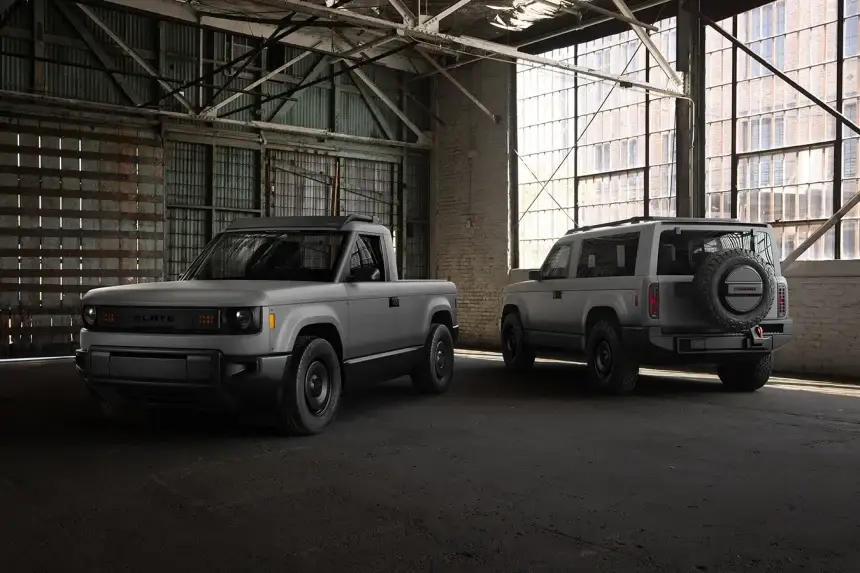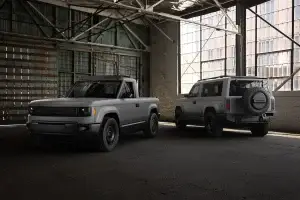Electric vehicle (EV) market is booming, but affordability remains a major hurdle. With the average price of a new EV hovering around $59,000, many consumers are priced out of the market. Slate Auto, a Michigan−based EV startup backed by Amazon founder Jeff Bezos, which aims to revolutionize the industry with its $25,000 electric pickup truck.
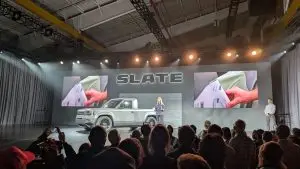
Slate’s bold vision—a no-frills, customizable, and ultra-affordable EV—could be a game-changer. But can this startup succeed where even Tesla has struggled?
The Slate Truck: A Bare-Bones EV for the Masses
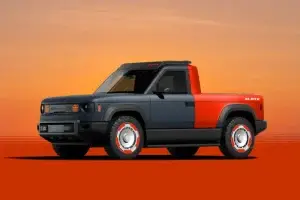
Key Features & Pricing
- Starting Price: 25,000(potentially under 25,000 (potentially under 20,000 with federal tax credits)
- Range: 150 miles (standard battery), 240 miles (optional extended battery)
- Powertrain: Single rear motor (201 hp, 195 lb-ft torque)
- Charging: 120 kW DC fast charging (0-80% in ~30 min)
- Design: Minimalist, unpainted gray composite body panels (vinyl wraps available)
- Interior: Manual windows, no infotainment system (phone mount instead)
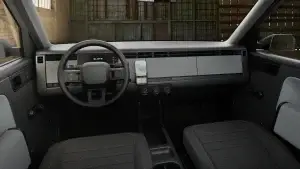
Unlike traditional automakers, Slate is embracing a DIY approach, allowing owners to customize their trucks with over 100 accessories, including:
- SUV Conversion Kit (transforms the truck into a 5-seater)
- Power window upgrades
- Off-road packages (lift kits, all-terrain tires)
- Vinyl wraps (replacing traditional paint)
Manufacturing & Cost Savings
Slate’s strategy hinges on simplified production:
- No paint shop (saving 350M–350M–500M)
- No metal stamping (composite plastic body panels)
- Single-configuration assembly (reducing complexity)
- U.S.-based production (Midwest factory, likely Indiana)
This lean approach allows Slate to target profitability quickly, a rarity among EV startups.
Why Slate Could Succeed
-
Filling the Affordable Electric Vehicle EV Gap
Tesla, Rivian, and Ford have focused on high-end EVs, leaving budget-conscious buyers behind. Slate’s sub-$25K price point (after incentives) makes it the cheapest new EV in the U.S., undercutting even the Nissan Leaf.
-
Customization & Aftermarket Potential
Slate’s “We Built It, You Make It” philosophy encourages owners to personalize their vehicles over time. This not only enhances customer loyalty but also creates a high-margin accessories business—similar to Harley-Davidson’s apparel and Jeep’s Mopar parts.
-
Strong Backing & Industry Expertise
- Jeff Bezos’ investment adds credibility.
- Ex-Chrysler & Harley-Davidson executives lead the company.
- Re:Build Manufacturing (founded by ex-Amazon execs) provides industrial know-how.
-
Direct Sales & Service Model
Like Tesla, Slate will bypass dealerships, selling directly to consumers. It also plans a nationwide service network, possibly partnering with existing chains (e.g., Midas, Monro).
Challenges Ahead
- Can Slate Really Deliver at $25K?
- Battery costs remain high, and tariffs could impact pricing.
- Federal EV tax credits may disappear under the Trump administration.
- Supply chain risks (e.g., reliance on SK On for batteries).
- Safety & Regulatory Hurdles
- The SUV conversion kit includes airbags and roll cages—will DIY installations meet crash standards?
- No infotainment system could deter mainstream buyers.
- Competition from Legacy Automakers
- Ford Maverick (hybrid, $28K) offers more features.
- Hyundai Santa Cruz is another compact pickup alternative.
- Will Consumers Embrace a “Blank Slate”?
Younger buyers may prefer tech-loaded EVs, while fleet operators could be hesitant about unproven startups.
The Bigger Picture: A Disruptor or Another EV Casualty?
Slate’s success hinges on:
✅ Hitting its $25K price target
✅ Scaling production without delays
✅ Building consumer trust in a new brand
If Slate can deliver, it could democratize EV ownership and force legacy automakers to rethink affordability. But if it stumbles, it risks joining the graveyard of failed EV startups.
Final Verdict: A Bold Bet on the Future of EVs
Slate Auto’s $25,000 electric pickup is one of the most ambitious automotive projects in years. By stripping away complexity and embracing customization, Slate is betting that Americans want simplicity, affordability, and personalization—not just flashy tech.
Will it work?
We’ll find out in late 2026 when the first Slate Trucks hit the road. Until then, the auto industry will be watching closely.
Would You Buy a $25K Slate Truck?
Let us know in the comments! And stay tuned for more updates on this groundbreaking Electric Vehicle. 🚗💨
